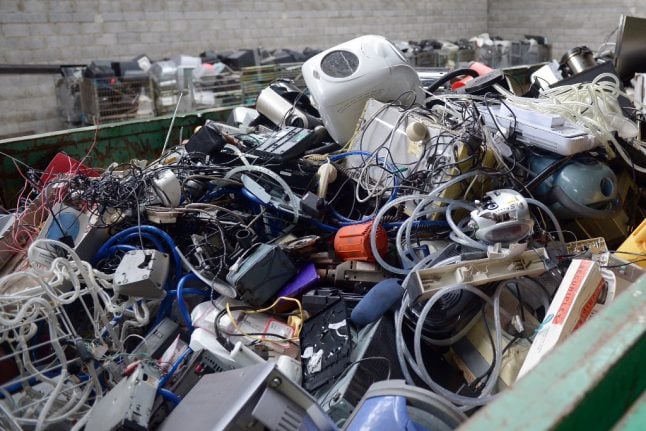 Photo: AFP
Photo: AFPENVIRONMENT
France announces ‘world first’ ban on destruction of unsold non-food products
French Prime Minister Edouard Philippe announced a ban on the destruction of unsold non-food products within two to three years in a move he described as a 'world first'.
Published: 4 June 2019 17:06 CEST

The destruction of household appliances will be banned under the new law. Photo: AFP
The French government is ramping up its anti-waste campaign in a move that will affect will affect online retailers such as Amazon and luxury goods brands.
The destruction of non-food items, such as clothing, household appliances, beauty and hygiene products will end in France within two to four years, Philippe announced on Tuesday.
The move will appear in an anti-waste bill which will be presented to the Council of Ministers in July and aims to instead ensure these products are given away or recycled from either the end of 2021 or the end of 2023.
The announcement came after Green parties surged across Europe in last month's European elections, not least in France where the EELV party came third with 13.5 percent of the vote.
The change comes as in addition to a raft of measures already adopted to fight food waste.
Today more than €600 million of new and unsold non-food products are discarded or destroyed each year, according to the government.
“We can avoid (…) this scandalous waste,” the prime minister told the French press. “Our idea is not to constrain or impose, but to support companies (…) to ensure that we move to a new stage in our economy.”
 Photo: AFP
Photo: AFP
France's junior environment minister Brune Poirson promised a law to tackle waste in January after a television documentary showed Amazon destroying
millions of products that had been returned by consumers.
Based on hidden camera footage, the documentary on the M6 channel showed containers of unsold or returned products at an Amazon warehouse being sent
for destruction under agreements signed between the online giant and third-party retailers.
British fashion firm Burberry also caused a furore last year by acknowledging that it had burned unsold clothes, accessories and perfume worth £28.6 million annually to prevent them being sold off cheaply.
The aim was to maintain the exclusivity and luxury mystique of the brand and it later became clear that the practise was relatively commonplace in the industry.
The French PM's office said special arrangements are anticipated for the luxury sector. Products which are not usable after a certain date would have exceptions.
President Emmanuel Macron has sought to portray himself as a friend of the Green movement, especially in the fight against climate change.
But his image was tarnished when prominent campaigner Nicolas Hulot, who Macron had named as environment minister, spectacularly quit the government
last August, saying that his cabinet colleagues were doing too little to tackle climate change.
Url copied to clipboard!


 Please whitelist us to continue reading.
Please whitelist us to continue reading.
Hmmm. Unintended consequences would include shortages of durable goods. Companies will underproduce, it seems to me, rather than get stuck with unsold inventory. Also, this would kill any innovation, due to the risks associated with a product that may not succeed. Maybe I’m missing something, but this doesn’t seem like a great idea.
It is a great idea. Recycling of goods will hopefully be factored into their production lifecycle and could also serve to close the loop in production with new goods being manufactured using recycled/reconditioned materials. Something that could always have been done but few have bothered as there was no incentive to do so. Endless production/endless waste is not a cycle that can continue and this is hopefully a first positive step in bringing that to a close.